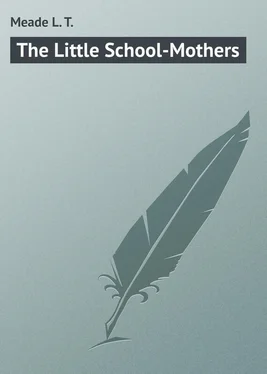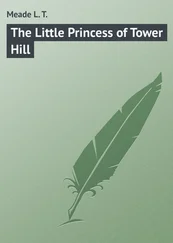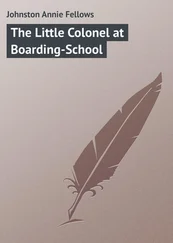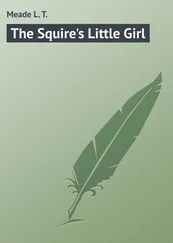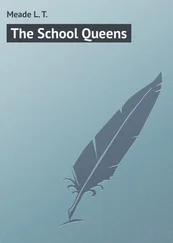L. Meade - The Little School-Mothers
Здесь есть возможность читать онлайн «L. Meade - The Little School-Mothers» — ознакомительный отрывок электронной книги совершенно бесплатно, а после прочтения отрывка купить полную версию. В некоторых случаях можно слушать аудио, скачать через торрент в формате fb2 и присутствует краткое содержание. Жанр: foreign_prose, foreign_children, на английском языке. Описание произведения, (предисловие) а так же отзывы посетителей доступны на портале библиотеки ЛибКат.
- Название:The Little School-Mothers
- Автор:
- Жанр:
- Год:неизвестен
- ISBN:нет данных
- Рейтинг книги:5 / 5. Голосов: 1
-
Избранное:Добавить в избранное
- Отзывы:
-
Ваша оценка:
- 100
- 1
- 2
- 3
- 4
- 5
The Little School-Mothers: краткое содержание, описание и аннотация
Предлагаем к чтению аннотацию, описание, краткое содержание или предисловие (зависит от того, что написал сам автор книги «The Little School-Mothers»). Если вы не нашли необходимую информацию о книге — напишите в комментариях, мы постараемся отыскать её.
The Little School-Mothers — читать онлайн ознакомительный отрывок
Ниже представлен текст книги, разбитый по страницам. Система сохранения места последней прочитанной страницы, позволяет с удобством читать онлайн бесплатно книгу «The Little School-Mothers», без необходимости каждый раз заново искать на чём Вы остановились. Поставьте закладку, и сможете в любой момент перейти на страницу, на которой закончили чтение.
Интервал:
Закладка:
“If I get the pony,” said Harriet, “I will let you ride him pretty often. You shall come over to our place, and you shall use my beautiful side-saddle; of course, my habit won’t fit you, you are such a round podge of a girl, but you can wear any old skirt. Shan’t I make that pony fly! I’ll give him beans! Oh, yes; I mean to have him.”
“But, after all,” said Jane, “that depends upon whether Ralph chooses you as his school-mother or not.”
“You leave that to me,” said Harriet.
“I am sure he won’t choose you,” said Jane. “He will choose Robina; he loves her now like anything.”
“He will choose me,” said Harriet. “I have a plan in my head, and he’s certain to.”
“But he hated you to-day,” said Jane. “If you really meant to win his heart, you shouldn’t have been so horridly cross to Curly Pate, and you shouldn’t have slapped him on the face.”
“I know,” said Harriet, in a contrite voice; “my passion got the better of me, but you may be certain I will be on my guard on Saturday. And look here, Jane: you have not the remotest chance on your own account of winning the prize, but if you help me to get it I won’t forget you in the matter of rides, and I will try and get Father and Mother to invite you over to our place very often during the holidays. You will like that, won’t you, Jane?”
“Love it,” said Jane, who, however, was by no means certain on that point, for, although Harriet had great power over her, she was a little afraid of her.
“Well, you shall come very often these holidays, and perhaps Mother might be coaxed to take you to the seaside with us; but everything depends on whether you help me to be school-mother to that boy. You will have to do your very best on Sunday. You’ll have to talk to him about me, and tell him all the wonderful things that I will do for him when I have him to look after, and you will have – whatever you do – to frighten him about the others, and most especially frighten him about Robina. Now, I think that is all. I shan’t bother about him, you may be sure, until Saturday. I think I know my way at last how to spite Robina, horrid thing! She is just mad to get that pony. I know life will be quite happy again if I can get it from her. Oh, she is sure of it – and Mrs Burton is so sure she’ll win, that she is not even going to be given a day to look after Ralph! Very unfair, I call it.”
Jane said nothing, but that night when she lay down in her little bed in the third form dormitory, her thoughts kept her awake. She did not much like the task she had undertaken. Harriet certainly was a tyrannical friend, and Harriet was growing less good each minute. Now that naughtiness was coming so terribly to the fore, poor little Jane felt in her heart of hearts that she did not enjoy it. It was all very well to burst out laughing during lessons and to play a practical joke on another girl, and to hide behind doors and spring out upon a frightened servant or a still more timid schoolfellow, and it was delicious to make apple-pie beds and to set booby traps and all those sort of things, but this sort of naughtiness, somehow, was different.
Jane had been impressed by Mrs Burton’s words: – “You must be unselfish, and forbearing, and thoughtful for others, and all these attributes will be good for your character, and will help you to be true women by-and-by.” Above all, Jane was struck with what Mrs Burton had said about these things being better than beauty, or riches, or talent, for these things were the best of all, and would stay with a girl and would help her through her life, and – and – help her after death. Jane was very frightened of death. The thought of it came to her sometimes in the middle of the night, but she always pushed it out of sight. Now, however, Mrs Burton spoke of something which would help her even after that had taken place. She shivered in her little bed. She did not at all like the task which was put upon her.
Meanwhile, things went apparently well in the school. Robina was as bright as ever on the next morning, and just as clever over her lessons, and just as apparently indifferent to her fellow-pupils. She had to all appearance forgotten the words she said to Harriet on the previous night. She talked cheerfully to Harriet. Harriet was forced to reply in the same tone. Afterwards the girls played in the garden, as they had done on the day before; but Harriet and Jane did not meet as they had previously arranged in the paddock. It was not necessary to meet, they both felt, for something had occurred since then, and their course was in a measure plain. Curly Pate was with them, too, and so were the other little children. The only one who was absent was Frederica; she and Ralph were not to be seen.
Late that night Frederica came up to the dormitory, and went to bed as usual. All the others clustered round her.
“Well – well,” they said, “could you manage? Aren’t you dead tired? What sort is he, really? Oh, do say if you think you have any chance of getting the pony!”
“I can say nothing – it wouldn’t be fair,” said Frederica. “Mrs Burton doesn’t wish any one of the girls on her trial to help the others by saying things. I have had a good day, I think, and am tired, and should like to go to sleep. Patience, you are to go to Ralph’s nursery at seven o’clock to-morrow morning.”
The next day was Thursday, and Thursday was Patience Chetwold’s day. It passed very much as Wednesday had done, only that Jane looked rather miserable, and Harriet took no notice of her at all. Friday was Rose Amberley’s day, and on that day the girls heard – or fancied they heard – peals of laughter in the distance. They were all rather anxious, for Rose was so remarkably nice, and had quite a way with little children. Before Robina came she had shared the honours with her elder sister, Constance, of being the babies’ favourite. The girls began to say amongst themselves that Rose would carry off the prize, and that, on the whole, they would like her to have it, for she was so kind and nice, and so remarkably pretty.
It was on the evening of Friday that Jane ran up to Harriet, pulled her by her arm, and said in a low tone: —
“I want to walk with you in the paddock.”
“Now, what’s up?” said Harriet crossly.
“Come,” said Jane.
Jane’s black eyes were shining, and her short black hair resembled a mop more than ever, and her little round figure seemed rounder. There was quite an agitation about Jane which made her roundness and queer short hair and round black eyes look too comical for words; at least, this was what Harriet said, when she found herself with her friend in the paddock. Harriet was such a contrast to Jane, and looked more lanky and more pale than ever on this occasion.
“Now – what is up?” she said. “You do look precisely like a fat Christmas goose just before he is going to be killed for Christmas dinner. What is up with you now?”
“Only that – I – I – mean – I don’t want to be the school-mother.”
Harriet burst into a peal of laughter. “Isn’t it a case of sour grapes?” she said. “You just know you can’t be the school-mother, so you think you’ll cover your defeat by saying that sort of thing.”
“I want to say more,” whispered Jane. “I am frightened to do what you want; I mean I am frightened to say what isn’t true about the others – and, particularly, about Robina. I don’t want to do it; I thought I would tell you.”
“I always knew you were a sneak,” said Harriet, “but please yourself, of course. It won’t be very nice for you when I send you to Coventry.”
“What do you mean by sending to Coventry?” asked Jane.
“You are a silly! You are frightfully ugly, and you have no brains at all. Coventry means that I won’t speak to you; and what’s more, I’ll get a lot more girls in the school not to speak to you. Perhaps you won’t enjoy that – but please yourself, I don’t care.”
Читать дальшеИнтервал:
Закладка:
Похожие книги на «The Little School-Mothers»
Представляем Вашему вниманию похожие книги на «The Little School-Mothers» списком для выбора. Мы отобрали схожую по названию и смыслу литературу в надежде предоставить читателям больше вариантов отыскать новые, интересные, ещё непрочитанные произведения.
Обсуждение, отзывы о книге «The Little School-Mothers» и просто собственные мнения читателей. Оставьте ваши комментарии, напишите, что Вы думаете о произведении, его смысле или главных героях. Укажите что конкретно понравилось, а что нет, и почему Вы так считаете.
